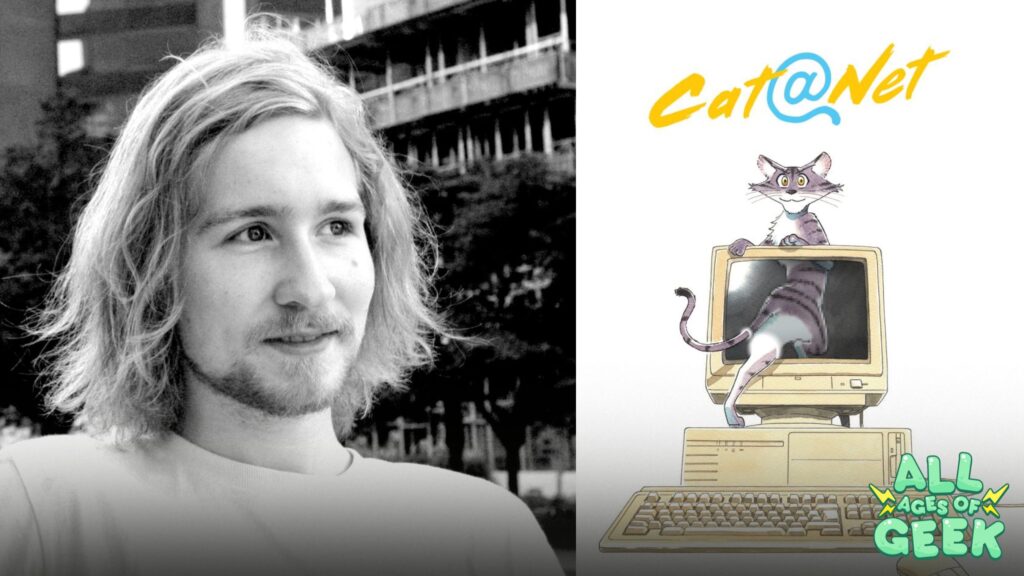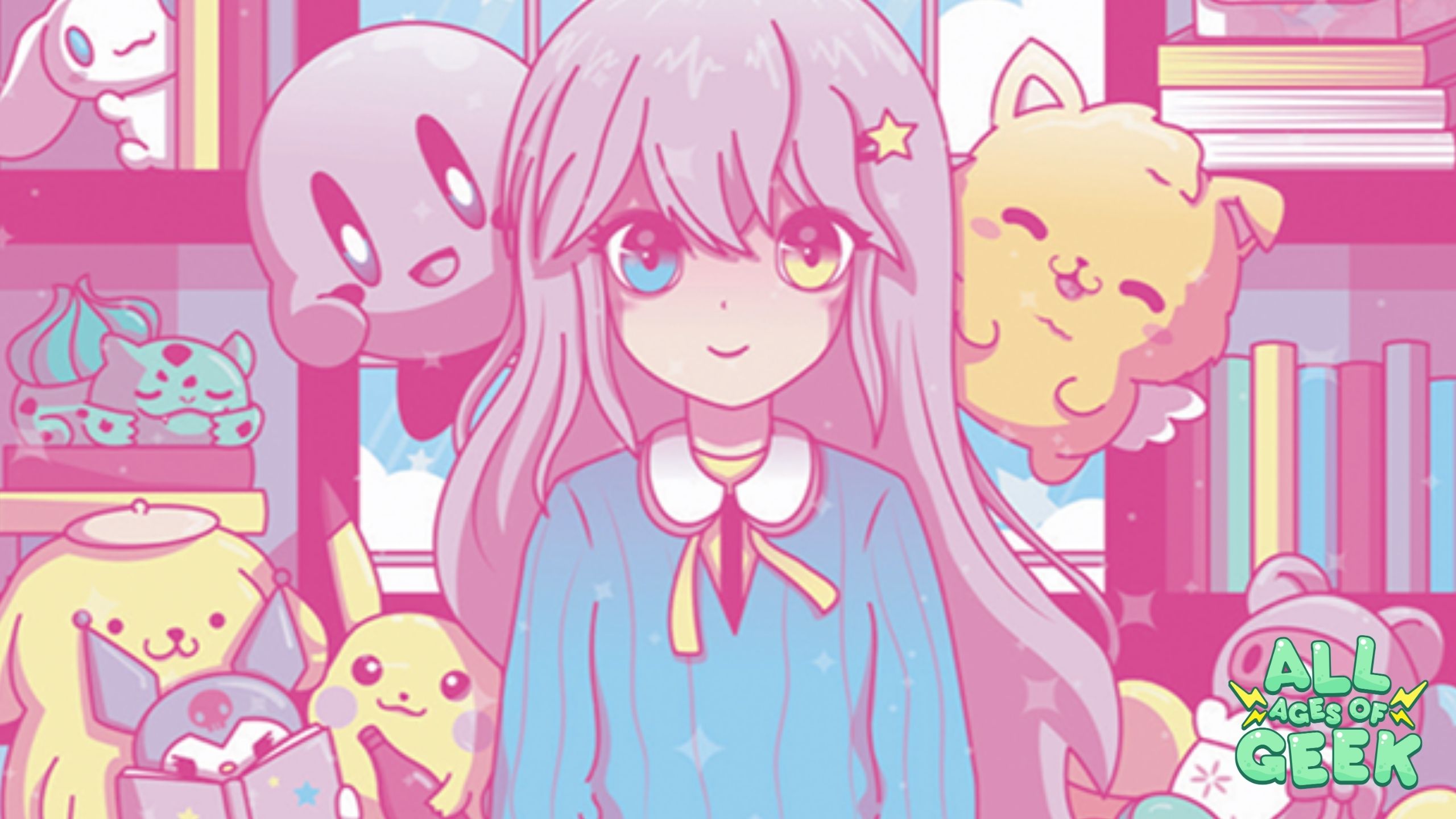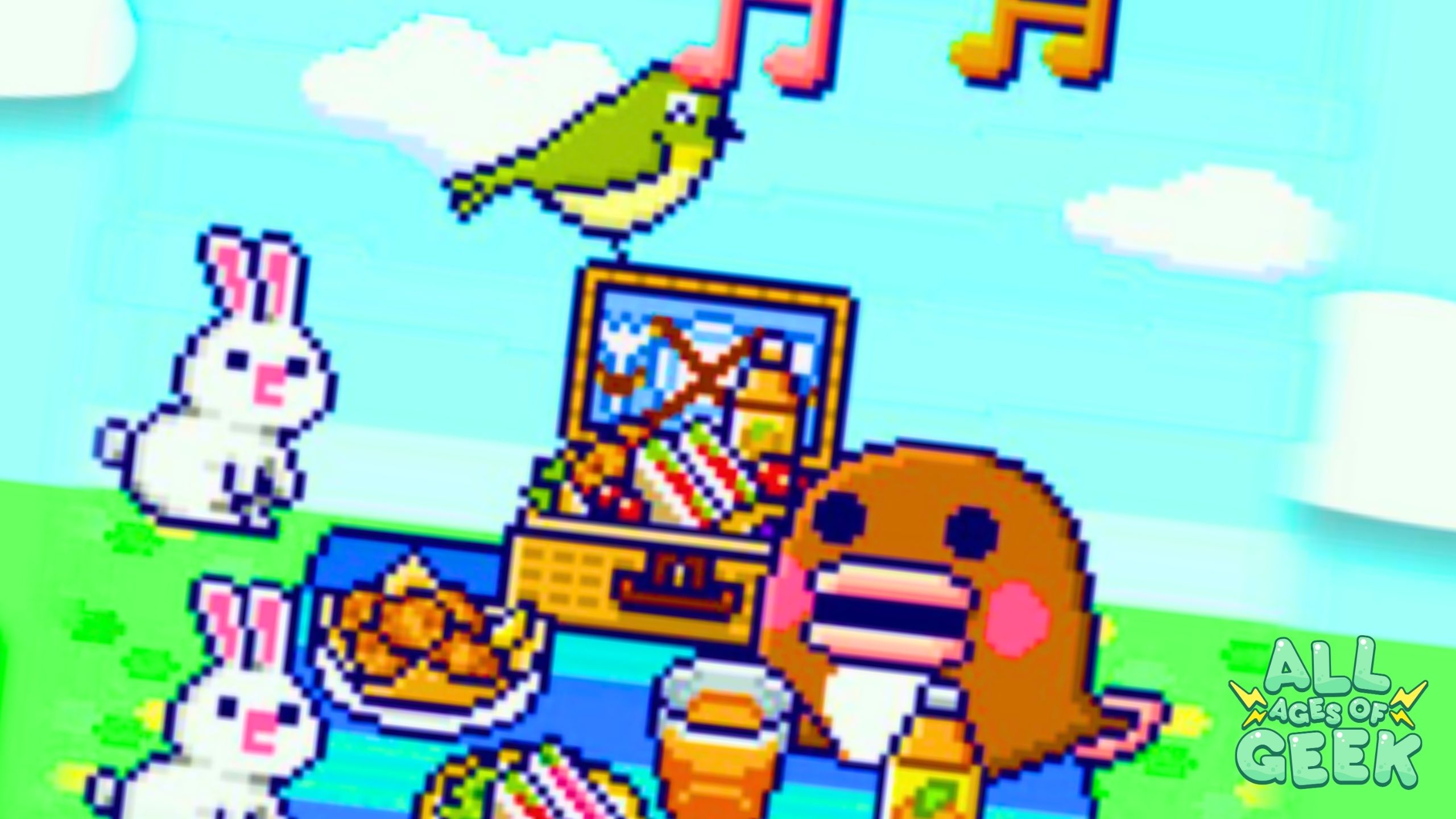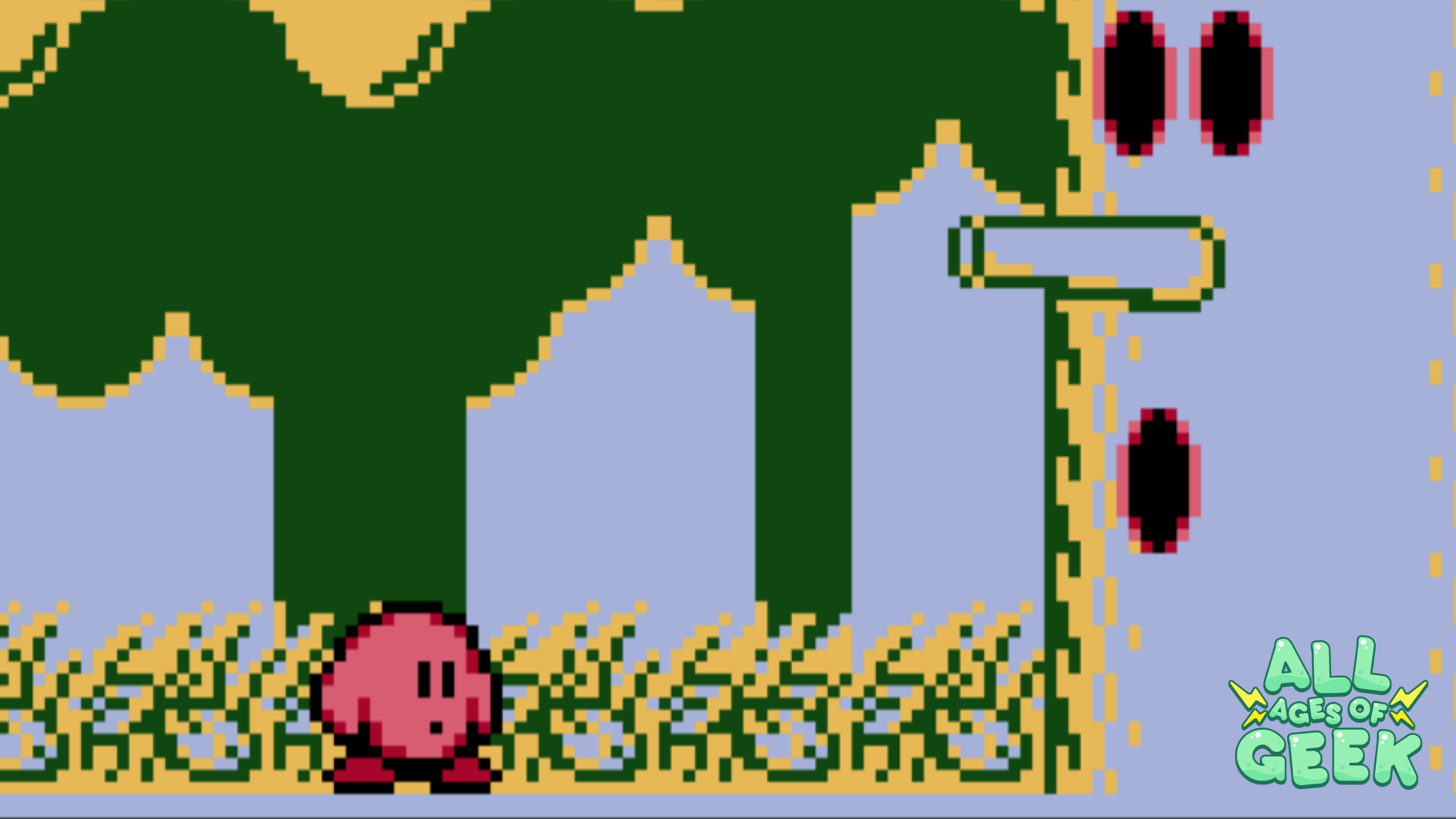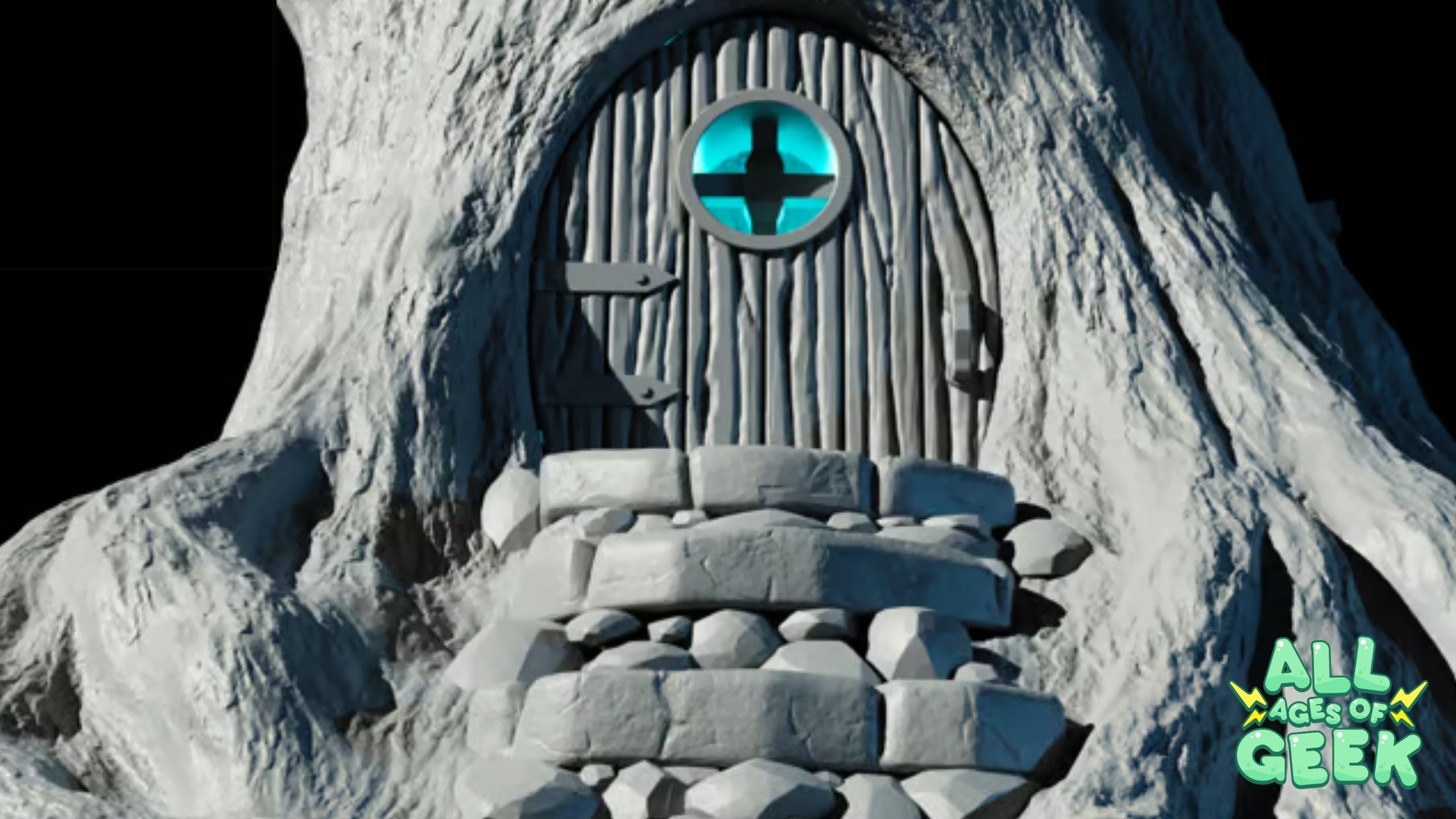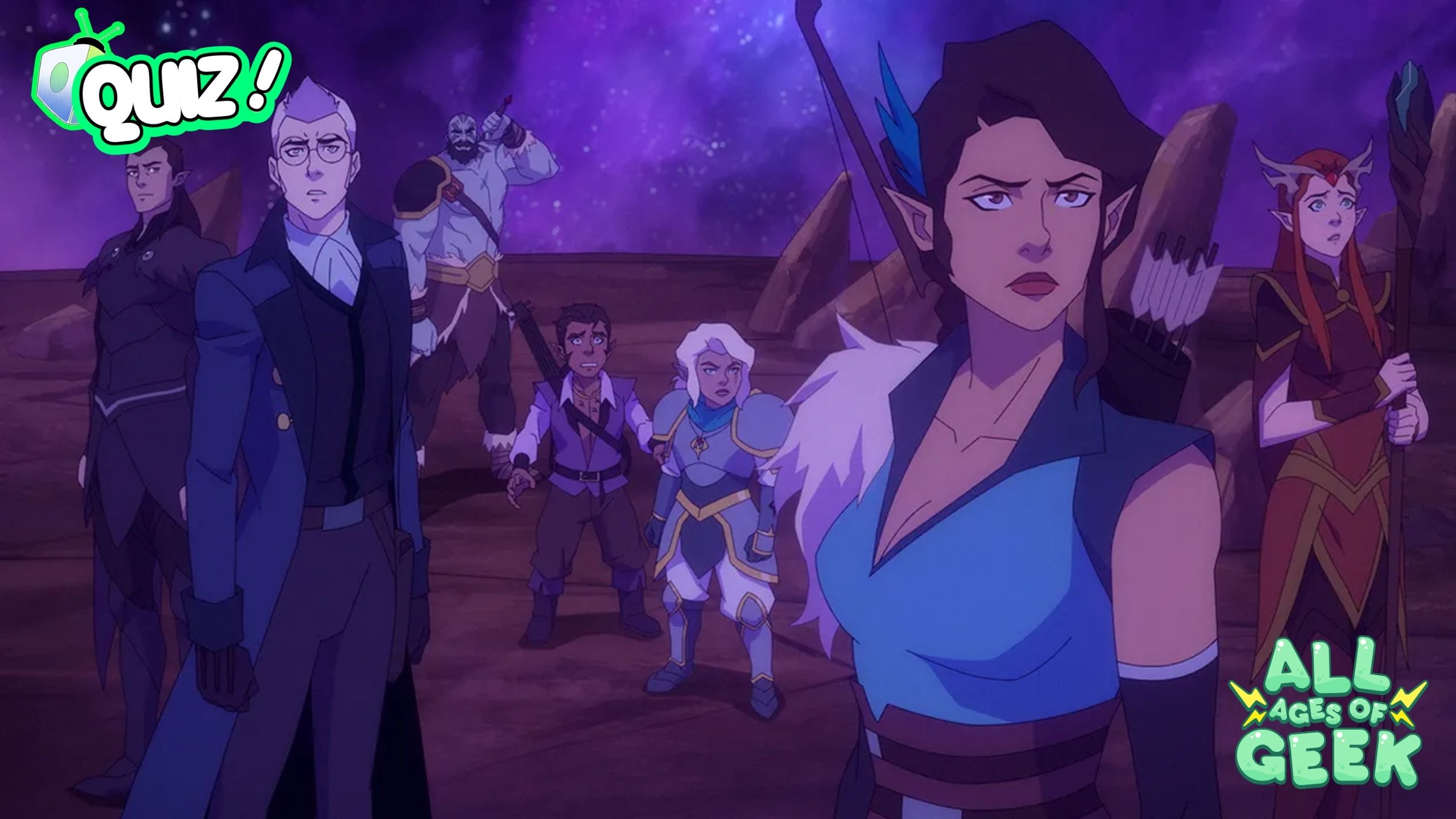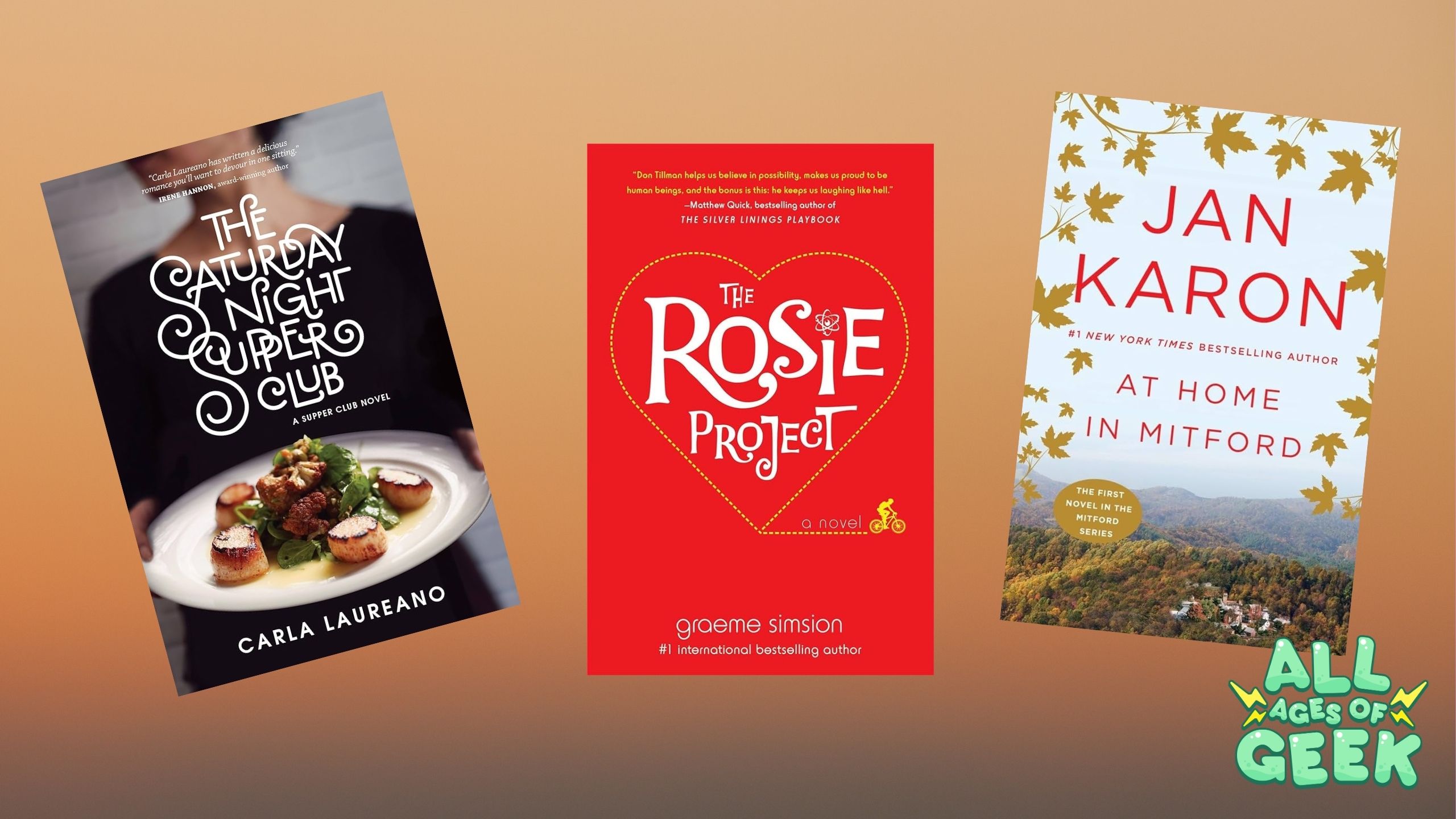Interview with Marvin Herbring creator of “Cat at Net” – All Ages of Geek Tapas Reviews
Welcome, fellow comic enthusiasts, to another exciting episode of “Creator Spotlight”! Today, we have a real treat in store for you as we sit down with the talented Marvin Herbring, the creator behind the delightful webcomic series “Cat at Net.” Marvin’s journey from a childhood passion for drawing to a successful comic artist is both inspiring and relatable, and in this interview, we’ll explore the creative process, the inspiration behind “Cat at Net,” and the joys of bringing imaginative worlds to life. So, grab your sketchbooks and join us as we dive into the captivating world of comics with Marvin Herbring!
What initially sparked your passion for creating comics, and how did that desire evolve into the work you produce today?
I think the answer to this question is the same for almost all comic artists out there: I enjoyed drawing since I was young, was exposed to comics & manga, and I always had a strong imagination and creativity (or so my mom says). Diving into unknown worlds through either comics, movies or video games always made me want to create something myself; merely consuming didn’t satisfy me enough.
That is probably why I spend the most time playing as a child either with Lego, or drawing. This then simply evolved into wanting to tell stories in the most fun and engaging way I knew, by creating comics.
Can you walk us through your journey as a comic creator, starting from the moment you first decided to explore this medium?
Actually, I only recently shifted back to becoming a comic artist.
I wanted to become one when I was young, but around 14 years old, it seemed like a somewhat unrealistic goal, or rather not a “real job” I can aim for. Thus, I focused more on becoming a concept artist for videogames and spend the next ten years creating all sorts of Sci-Fi and Fantasy illustrations.

However, single artworks can only have that much lasting impact, and I kinda became bored with only drawing the next spaceship, dragon, or whatever. At this point in time, things had changed, and now it was possible to become a self-published comic artist without the necessity of a contract with a big publishing house.
I had the desire to create something more than just an array of pretty pictures and decided to finally sit down and work on a project that could potentially have a lasting impression on its readers.
Your work touches on various themes and subjects. How do you choose which stories to tell, and what do you hope your readers take away from them?
To be honest, I do not aspire to ‘open my reader’s eyes’ for something they weren’t aware of before, nor does my current story evolve around something political, or important social issues. I admit that my story is simply meant to entertain and to be a fun read, and nothing to change somebody’s outlook on life. That is why its enough for me if the reader’s takeaway is nothing more than enjoyment (which I believe is already a difficult task!).
What led you to choose Tapas as the platform for sharing your comics, and what aspects of the site do you find most appealing for your work?
I only just made my debut on Tapas a month before the time of this interview, and one year after my comic started.
I was aware of Tapas before, but my story didn’t seem like the right fit for this platform back then (and maybe not even now). With its clear focus on the romance and fantasy genres as well as comics being intended for a mobile scrolling format, I considered Tapas to be somewhat of simply an additional platform to advertise my comic when I decided to join, nothing more.
Now though, it has started to be picked up by readers little by little, and the feedback so far has been nothing but positive. While a traditional watercolor cat adventure comic might not be suited for Tapas initially, the big advantage of this platform is that its focus lies on comics, and nothing but that. Those who come here are very specifically looking for interesting comics to discover, which is miles away from the average instagram user, to whom comics are on the very low end of the desired content.
From a more technical standpoint, other image sharing sites do not not really lend themselves to be used for sequential, ongoing art (such as a continuous story).
Scheduling the release of each page is also a huge benefit.
Tapas has its own unique features and community. Are there any aspects of the platform that you feel could be improved, or perhaps have been challenging to navigate?
My biggest critique would be its previously mentioned one-sided focus on fantasy-romance. As a newcomer to Tapas, one might easily get the impression that there are not only hardly any (successful) stories besides these, but also that each story within this genre feels too similar to the next one.

Only really featuring comics that have been successful for a long time already also seems to be working strongly against discovering new works, as new readers are being deliberately directed away from these.
I would argue for an option to switch to a either completely randomized frontpage or to “rising newcomers” instead of having the same five stories shown for months on end.
In your opinion, what distinguishes independent comics from mainstream comics, and why do you think the indie scene is important for the overall comic industry?
I would even argue that the indie scene is more valuable than mainstream comics are, due to the far wider variety of themes and styles. Publishers are often slow to adapt, and afraid to test new things.
Many “indie hits” would have probably not even seen the light of day in times past. Just think of how often J.R.R. Tolkien and other genre-defining authors had been rejected by the ‘authorities’ before eventually getting the recognition they deserved. The indie scene is where these creators are made, and allowed to grow and learn.




Publishers these days often only pick up new artist who are already successful within the indie world, and rarely foster new talent themselves.
It’s the classic “must have 10 years of experience (as we won’t teach you)”-ad.
As a comic creator, what are some unique storytelling techniques you’ve developed to set your work apart from others in the genre?
None. I’m not going to pretend I invented any special techniques that no one has done before. I am mixing things I’ve learned from both manga and graphic novels, but I wouldn’t go so far as to say that I developed any of these myself.
Coming up with new ways to set yourself apart and breaking established rules in storytelling might even cause a disconnect with your reader or appear a bit forced even.
My comic being a cat adventure is enough to set it apart already, I believe.
Apart from your comics, what other avenues do you explore to engage with your audience, such as social media, live events, or merchandise?
It has both become more easy and more stressful to engage with your audience these days than it ever has been. We can interact with our readers instantaneously via messages, chats or even live on a stream.
We receive feedback to our work within seconds after uploading it, rather than through printed reviews and possibly fan-mail weeks after its publication.
These innovations come with as many advantages as problems. Being “constantly” online via the phones we carry with us everywhere and receiving (or not receiving!) instant feedback from many different sources brings its own form of stress and pressure.

Also, each interaction is usually very brief and anonymous.
So far, my audience isn’t big enough that events or merchandise are something on my mind, but I can say that I enjoy direct interaction during comic conventions more than any interaction that social media can provide.
Creating comics can be both rewarding and challenging. Can you share some of the struggles you’ve faced along the way, and how you’ve overcome them?
As odd as it sounds, I decided to make a traditional watercolor comic before I was even a proficient watercolor artists. Simply from works such a s Blacksad and other, mostly even older graphic novels, I knew that I didn’t want to work digitally.
To me, the difference is drastic, and I knew the look I wanted my project to have.
Thus, I had to learn a new medium before even starting my comic.
It took me three attempts of starting from scratch before I was satisfied with the result.
While this was most likely my biggest individual challenge, the rest boils down to small daily problems that come from working traditionally without having a “ctrl+z”-shortcut.
Otherwise, in terms of writing, finding natural ways to connect the scenes in your story (how does the character discover this information/ how do they get from A to B, etc.) can also be tricky. Nothing else you can do but keep thinking about it, in that case.
Are there any comic creators, artists, or writers who have been particularly influential or inspiring to you? How have they shaped your creative journey?
It is hard to pinpoint a single creator here. The current me is an amalgamation of all the impressions and stories that have influenced me so far, and who takes precedence depends more on the point of time in my life rather than the work itself.
At a around 4 years, my first fandom must have been Power Rangers. Then it shifted over time to new discoveries, like Star Wars, Sailor Moon, Zelda, Pokemon, Dragonball, Neon Genesis Evangelion, Lord of the Rings, Berserk, and many other series that probably all of us experienced, as well as a few more niche and independent works of media.
However, to drop a few names without any particular order or weight to them:
Akira Toriyama, Steven Spielberg, J.R.R. Tolkien, Hideaki Anno, Jiro Taniguchi, Satoshi Kon, Neil Gaiman, Alan Moore, Wes Anderson, Shinichi Sakamoto, Hideo Kojima, Juanjo Guarnido, Mateusz Urbanowicz, Masaaki Yuasa, Shu Takami… (and many others I forgot here!)
For aspiring comic creators, what are some practical tips and advice you would give to help them find their own voice and style?
Patience. Especially if you are still young, time flows very slowly. A year or two (or three, or more…!) might seem endlessly far away, but just take this time to hone your technical skills first before diving straight into a lengthy project.
You will find that the skills you developed will make the process go easier and smoother, and you will easily recover the “lost” time by not struggling nearly as much with each drawing.
Also, do not listen to people telling you “draw every single day”. Rather, make the times you sit down count instead of sketching a few lines to fulfill a daily goal. Think of the real purpose behind practicing.
The same goes for social media – do not upload every single sketch for instant gratification! That is not what sketches and practice are for! Creating art for the sake of likes is a surefire way to kill your motivation.
Can you tell us about your creative process, from brainstorming ideas to the final execution of your comics? How do you stay motivated and consistent throughout?
I’ve been carrying my current project around with me in my head for over ten years, so I’ve had much time to slowly roll each idea around and add and subtract things here and there. I can’t really say much else about my creative process than that most ideas usually just appear out nowhere, specifically when I am >not< thinking about my comic.
I did not sketch out the entire storyboard before starting the comic, as this would limit me in changing things around on the fly, since many ideas are also born during the creative process. Only when I see a drawing or page in front of me am I able to judge what works and what doesn’t.
I never really struggled in terms of staying motivated to be honest. I’m always looking forward to drawing the next fun scene, and that fun is usually enough to make me want to keep continuing, as well as the excitement about wanting to one hold the finished product in my hands.

Thinking about future projects after my current one is finished also makes me want to get it done as fast as possible, so I can start the next one!
However, I don’t mind taking a few days off and focusing on something else for a bit when I feel like it either. Not unnecessarily pressuring yourself helps as well, I guess.
How do you balance the creative and business aspects of being an independent comic creator, such as promoting your work and managing finances?
Usually, I work on my comic in the afternoon, then come home in the evening and do some business-y related work (social media, e-mails…) around dinner, and then some more comic work at night (editing the latest page or sketching the next). Again, there’s no set schedule for anything in my case.
Funding creative projects can be challenging for many artists. What strategies have you employed to fund your comics, and are there any resources you’d recommend to other creators?
I’m not really the best person to ask this kind of question, and although I dislike evasive answers such as “it depends on the person”, it really depends on the person.
Its a question of where you reside, your financial background, physical and mental abilities, age, family responsibilities… I don’t want to give a simplistic answer to a complex question, so I won’t.
How do you stay updated on the latest trends and developments in the comic industry, and how do you integrate this knowledge into your work?
Not at all, and I don’t.
I don’t think there’s a point in chasing after trends – if you’re goal is success, but not creating the thing you would like to create, you are not doing art, you are doing business.
Altering your work based on current trends (which will fade eventually anyway) will only damage it in the long run.
First, it will lose its uniqueness, and later, it will reek of “a byproduct of >that< era”, like any 2008 vampire love story.
In what ways do you believe the comic industry is evolving, and what opportunities do you see for independent creators in the future?
The biggest changes are the previously mentioned ways of interaction through the internet and social media (leaving out stupid AI-art for now).
Artists can now create a fan-following, engage with their community like never before and even have their livelihood financed through their supporters.
With the rising possibilities of self-publishing and indie-publishers, contracts with huge publishers are becoming less and less necessary for someone to “make it”.
These developments make it easier than ever for anyone to become a comic artist.
Furthermore, comics and manga will become more mainstream and more widely accepted media, due to the generational shift. Those who consider comics to be more than something “just for kids” have become adults at this point, with monetary power to further nurture the market.
In terms of future developments, I believe that we will see more digital comics and comic-apps with subscription-based reading flatrates similar to streaming sites, and fewer printed works, especially for new titles.
Due to the rise in Webtoons, I also think there will be fewer lengthy graphic novel-like projects and a stronger shift towards short comics or comic-strips which can be updated frequently and make it easier for new readers to jump in.
Collaboration can be an essential part of the creative process. Have you worked with other creators or artists on projects, and if so, how have those experiences shaped your work?
It might be because I’m an only child or because I just haven’t found the right people yet, but so far I’ve been doing better on my own. In a team, you don’t only have to agree on the content of your shared project (story, art, tone, characters…), but you also have to match each other’s pace, goals, demeanor and so on. I truly admire people who can collaborate like this on a project over a longer period of time, as the synergy usually helps creating something that would have been impossible alone.
Sometimes, I wish I could bounce of some ideas with someone like-minded, but I also fear that I wouldn’t like their input and turn them off for being unappreciative…
What are some personal or professional goals you have for your comic career, and how do you plan to achieve them in the coming years?
My biggest goal is to simply finish the project, preferably within a moderate time frame.
I would also like to get it printed, either through self-publishing or within a publishing house, we’ll see.
Also, I already have ideas for the next project and how I would like to go about that, but now’s not the time to share any information. Being able to tackle this vision the way I’d like to would be my “next” professional goal I’d say.
As a creator, how do you measure success, and what achievements are you most proud of so far?
On a smaller scale, having an artwork – a drawing, scene or page – turn out they way you had in mind and not thinking “ugh, this is garbage” is already a success for any artist I’d wager 😀
On a larger scale, having people be genuinely interested in my comic and enjoying reading it is all I could ever ask for. Especially with the over-abundance of available entertainment media out there, any person deciding to take their time of the day and spend it reading on something I created is a success to me, and something I feel very thankful for.
I know that my comic isn’t exactly mainstream or riding the current Zeitgeist, so I’m not expecting a cult following or a movie adaption. That is why simply continuing it until its finished is an achievement to be proud of in itself.
Lastly, could you share an anecdote or experience from your comic-creating journey that has had a profound impact on you, and what did you learn from it?
This is less something that happened to myself, but more something that I’ve observed in others: artist pushing themselves over the limit, experiencing burnout, getting little returns for their efforts in terms of acknowledgment and ultimately quitting their comic or artistic career.
The current situation where everything is happening on social media makes it all to easy to compare oneself and one’s artistic accomplishments with others based entirely on numbers (views, likes, followers), without any glimpse on how these other artists got there, or how long it took for them to reach this level of popularity.
Investing so much time and money into something so very dear to oneself without receiving any form of recognition while the picture of a frappuccino might sit at 5k likes can feel crushing. You start to wonder what you are putting all the energy in for, and why you sacrifice such a huge part of your life for something nobody else cares about.
I’ve seen many artists fall victim to this “numbers game”, even though likes and viewcounts were never meant to make you feel good in the first place, but to feed the algorithm with marketing-relevant statistics.
That is why I try not focus on how many likes each new page gets, or on how long its been since my last follower or whatever. I’m not creating art for the purpose of making some superficial number go up. I do it because I want to.
And that concludes our enlightening conversation with the amazing Marvin Herbring, creator of “Cat at Net.” We hope you’ve enjoyed this deep dive into the world of comic creation, and that you’re inspired by Marvin’s journey from a young artist to a successful comic creator. It’s always a pleasure to explore the passion and dedication that goes into crafting these engaging stories, and we’re sure you’ll agree that “Cat at Net” is a fantastic addition to the comic universe. Thank you for joining us on this adventure, and be sure to keep an eye out for more incredible stories from Marvin Herbring and other talented artists in the world of comics!
Social
Tapas: https://tapas.io/series/CatNet/info
Instagram: https://www.instagram.com/cat_at_net/
YouTube: https://www.youtube.com/channel/UCweCTrQJS7tK_zO1Pl3HGww
Twitch: https://www.twitch.tv/cat_at_net
Website: http://www.cat-at-net.com/
About Stec Studio, All Ages of Geek and “I Married a Monster on a Hill”
Stec Studio is a New Jersey-based company founded and run by by the Stec Sisters. We specialize in producing interactive comics and novels based on All Ages of Geek media, as well as creating a fully open world Boys Love Universe called BLU Media. This universe is being built from various media forms, including readable media, games, and animations.
Our main series, I Married a Monster on a Hill, is a WEBTOON that tells the story of a retired knight who falls in love with a half-monster. We are also developing an in-production visual novel called I Married a Monster on a Hill: Dates, along with an upcoming Wattpad Exclusive set in the same Universe. At Stec Studio, our goal is to create content that gives people hope and light, and we hope our stories can provide joy and entertainment to all who experience them.


